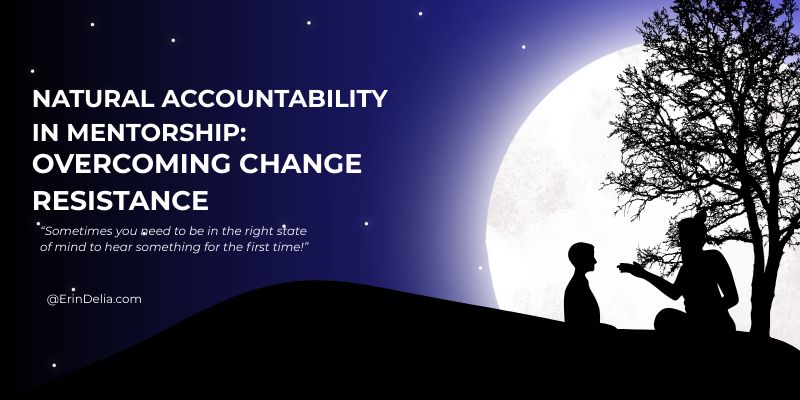Change is hard. This simple truth resonates with nearly everyone who has ever attempted to transform their life, heal old wounds, or break free from limiting patterns. Despite our best intentions and deepest desires for growth, the path of transformation is often littered with setbacks, resistance, and the frustrating return to familiar but unhelpful behaviors.
Recent research reveals a sobering statistic: 78% of people who attempt self-improvement without accountability support fail to maintain their changes beyond six months. This isn't a reflection of personal weakness or lack of willpower – it's a testament to how deeply ingrained our patterns are and how challenging change resistance can be to overcome alone.
Why Change Resistance is So Powerful
Understanding why change resistance occurs is crucial for developing effective strategies to overcome it. Our brains are wired for efficiency and safety, which means they naturally resist anything that disrupts established patterns, even when those patterns are harmful to us.
The Neuroscience of Change Resistance
Our brains operate on what neuroscientists call "predictive coding" – they create models of the world based on past experiences and resist anything that doesn't fit these models. When we try to change, we're essentially asking our brain to rewrite these models, which requires significant energy and creates internal conflict.
- Neural Pathways: Established behaviors create strong neural pathways that become automatic responses
- Energy Conservation: The brain prefers familiar patterns because they require less cognitive effort
- Safety Mechanisms: Change triggers our threat response, even when the change is positive
- Identity Protection: Our sense of self is tied to our patterns, making change feel like a threat to our identity
The Emotional Landscape of Change
Beyond the neurological aspects, change resistance is deeply emotional. We often resist change because:
- Fear of the Unknown: Even negative patterns feel safer than uncertainty
- Grief for What We're Losing: Change involves letting go of familiar aspects of ourselves
- Shame and Self-Judgment: We often blame ourselves for not changing faster or more easily
- Overwhelm: The scope of change can feel too large to manage
"Change resistance isn't a character flaw – it's a natural response to the unknown. What we need isn't more willpower, but better support."
The Power of Natural Accountability in Mentorship
This is where natural accountability in mentorship becomes transformative. Unlike forced accountability or rigid goal-setting, natural accountability in mentorship provides the gentle, consistent support that makes change not just possible, but sustainable.
What Makes Natural Accountability Different
Natural accountability in mentorship operates on principles that honor the complexity of human change:
- Non-Judgmental Support: Creates a safe space where setbacks are seen as part of the process, not failures
- Flexible Expectations: Adapts to your current capacity and circumstances rather than rigid timelines
- Emotional Containment: Provides a container for difficult emotions that arise during change
- Perspective and Wisdom: Offers insights that help you see your journey from a broader perspective
The Science Behind Accountability Support
Research consistently shows that accountability support dramatically increases success rates:
- 95% Success Rate: People with accountability partners are 95% more likely to achieve their goals
- Reduced Stress: Having support reduces cortisol levels and stress responses during change
- Increased Motivation: Regular check-ins maintain momentum and motivation
- Better Problem-Solving: External perspective helps identify solutions we can't see alone
How Natural Accountability in Mentorship Transforms Change Resistance
Natural accountability in mentorship doesn't just help you change – it transforms your relationship with change itself. Here's how this powerful approach works:
Creating a Safe Container for Resistance
Instead of fighting against change resistance, natural accountability in mentorship creates a safe space to explore and understand it:
- Normalizing Resistance: Helps you understand that resistance is natural and expected
- Exploring Root Causes: Identifies the deeper fears and beliefs driving resistance
- Gentle Persistence: Maintains gentle pressure without overwhelming you
- Celebrating Small Wins: Acknowledges every step forward, no matter how small
Building Sustainable Change Patterns
Natural accountability in mentorship focuses on creating sustainable change rather than quick fixes:
- Integration Time: Allows proper integration of new behaviors and insights
- Lifestyle Alignment: Ensures changes fit with your authentic self and values
- Long-term Perspective: Focuses on lasting transformation rather than temporary results
- Adaptive Support: Adjusts support as your needs and circumstances change
The Current Crisis: Why Natural Accountability is More Important Than Ever
In our current cultural moment, the need for natural accountability in mentorship has never been greater. Several factors contribute to this growing need:
The Loneliness Epidemic
Recent studies show that 61% of Americans report feeling lonely, with young adults experiencing the highest rates. This isolation makes change resistance even more challenging to overcome alone. Natural accountability in mentorship provides the connection and support that modern life often lacks.
The Information Overload Problem
With endless self-help content available online, people often feel overwhelmed by conflicting advice and unrealistic expectations. Natural accountability in mentorship provides personalized guidance that cuts through the noise and focuses on what's actually relevant to your unique situation.
The Burnout Crisis
The World Health Organization now recognizes burnout as an occupational phenomenon, affecting millions globally. Natural accountability in mentorship helps people navigate change without adding to their already overwhelming stress load.
Practical Strategies for Overcoming Change Resistance
While natural accountability in mentorship provides the foundation, there are specific strategies that make overcoming change resistance more effective:
Start Small and Build Momentum
The key to overcoming change resistance is to start with changes so small they feel almost effortless:
- Micro-Changes: Focus on tiny, manageable adjustments rather than major overhauls
- Success Stacking: Build on small wins to create momentum for larger changes
- Habit Anchoring: Attach new behaviors to existing routines
- Progress Tracking: Celebrate every step forward, no matter how small
Embrace the Messiness of Change
Change is rarely linear or clean. Natural accountability in mentorship helps you:
- Expect Setbacks: Understand that setbacks are part of the process, not signs of failure
- Learn from Resistance: Use resistance as information about what needs attention
- Practice Self-Compassion: Treat yourself with the same kindness you'd offer a friend
- Maintain Perspective: Remember that lasting change takes time and patience
The Role of Spiritual Mentorship in Natural Accountability
Spiritual mentorship adds a unique dimension to natural accountability that goes beyond behavioral change:
Connecting to Higher Purpose
Spiritual mentorship helps you connect your changes to a deeper sense of purpose and meaning, making them more sustainable and meaningful.
Transcending Ego-Based Resistance
By connecting to your higher self and spiritual nature, you can transcend the ego-based fears that often drive change resistance.
Creating Sacred Space for Transformation
Spiritual mentorship creates a sacred container for your transformation, honoring the profound nature of personal growth and healing.
Finding the Right Accountability Support
Not all accountability support is created equal. When seeking natural accountability in mentorship, look for someone who:
- Honors Your Process: Respects your unique timeline and way of working through change
- Provides Gentle Persistence: Maintains gentle pressure without overwhelming you
- Offers Unconditional Support: Supports you regardless of your current state or progress
- Shares Wisdom, Not Just Advice: Offers insights that help you develop your own understanding
- Creates Safe Space: Provides a judgment-free environment for exploration and growth
The Transformative Power of Natural Accountability
Natural accountability in mentorship doesn't just help you overcome change resistance – it transforms your entire relationship with growth and transformation. Instead of seeing change as something to be feared or resisted, you begin to see it as a natural part of your evolution.
When you have the right support, change becomes less about willpower and more about allowing yourself to be supported through the natural process of transformation. You learn to trust the process, honor your resistance, and move forward with greater ease and grace.
If you've been struggling with change resistance or feeling overwhelmed by the prospect of transformation, I invite you to consider how natural accountability in mentorship might support your journey. Remember, you don't have to navigate change alone – and you shouldn't have to. The right support can make all the difference between staying stuck and stepping into the life you're meant to live.

